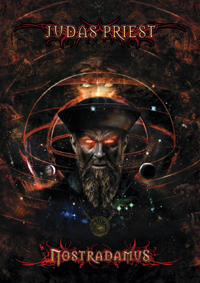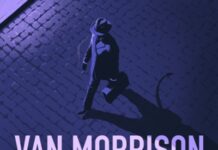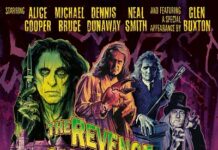Ever since Rob Halford returned to the scene of the crime with Judas Priest,
expectations have been high for the Metal Gods. The 2005 reunion album Angel
Of Retribution and subsequent tour got the ball rolling, but what did
the leather-and-studded mavens have in mind for an encore? How about a bloated,
overly ambitious concept album about the quirky 16th French prophet Nostradamus?
No small feat indeed. For a metal institution like Priest, it certainly presented
an odd range of obstacles to work around and overcome.
Priest press hard at selling the plight of Nostradamus in
a fist-pumpin’ hard-rockin’ manner. Not that metal shies away from
bigger-than-lifer images and concepts; on the contrary, it swallows them up
whole and spits them out like shiny new jewels. On the surface, tackling a mythic
figure like Nostradamus — whose cryptic quatrains of prophecy stretched
the bounds of speculation and interpretation — may seem like a sound and
calculated move for a band ready to throw down the gauntlet and roll in the
mud, but is it powerful and accessible enough to keep the card-carrying masses’
heads a-bangin’? It really depends on which side of the grandstand you
sit on.
The anticipation swells as “Dawn Of Creation” builds and explodes
before “Prophecy” takes a big bite of the melody, pile driving the
arrival of Nostradamus — “the voice of God.”
Rob Halford’s shrieking and salient vocals shift and shape each song into
another step of the story, with short instrumental passages setting up the general
rhythm and pace. “Revelations” entices the listener to forgive Nostradamus
and his tormented admonishments as it swims through the orchestration, and embraces
the frenetic fretwork of K.K. Downing and Glenn Tipton. Whether singing in English,
French or German, Halford’s commanding operatic style comes to the fore,
driving the drama of “War” before delivering the ensuing catastrophe
behind “Pestilence & Plague,” which eventually leads to “Death.”
At the halfway point, you’re either loving this grim tale or looking
for an exit. The record assumes a far more introspective mode, imploring God
in “Lost Love,” which obscurely addresses the loss of Nostradamus’
wife and children to the Plague in 1534. Moving from medicine to the occult,
the prophecies of Nostradamus drew religious persecution and
embroiled the former apothecary in further controversy. This is met head-on
by Judas Priest who counter persecution with crucifixion for maximum impact.
As the short segues alter the record’s moods, creating a template that
is neither inviting nor dissuasive. It’s rather easy to get pulled into
the next number by sheer curiosity.
And as the ultimate heavy metal group gets comfy with swirling choirs, sweeping
orchestrations, and acoustic embellishments, the lyrics dance around the seer
and his almanac full of prophetic quatrains that supposedly spell out the end
of mankind. But it isn’t until the final number, ironically called “Future
Of Mankind,” ambiguously outlining Nostradamus’ own fateful demise,
that we are clued into the power of the man’s premonitions. Still, it’s
highly doubtful he announced his end with the velocity of Judas Priest.
As a heavy metal album, Nostradamus struggles to play along
like the others, unforgiving of the tried and true ingredients to distinguish
it from the denizens of ruffian riffs drowning in mediocrity. As a whole, Nostradamus
is Priest flexing their mighty metal talons in search of copious and cerebral
stimulus suffocating under the weight of three chords and common incoherency.
For a band like Judas Priest to stomp on the soapbox without falling into a
cesspool of mockery and misadventure is commendable, to say the very least.
If they can pull it off live, they may set a new precedent for vintage metal
and beyond.
~ Shawn Perry.




















